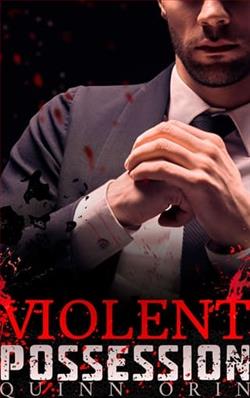Page 41 of The Witch of Cologne
been able to banish her image from his mind. Now here he is, standing before her. While his thoughts gather themselves, he returns his focus to the panorama outside: the empty town square through the poplar trees, beyond it the windows flickering yellow and gold with candlelight. It is past evensong and many are preparing for bed: the kitchen table is being cleared, the hearth dampened, the quilts pulled back, each family wrapping itself tight against the frosty winter. A woman with a babe in arms walks across one of the windows. Smiling, she turns back into the room—to whom? A man? Her husband?
Staring out, Detlef wonders what he has sacrificed: this unexamined rhythm of life, the security of being loved without question, the instinctive urge of reproduction—the basic tenets of life which, in this moment, are utterly appealing.
The sound of Ruth coughing makes him swing around. Fully conscious now, she clutches at the robe the canon sent to clothe her. Detlef is gripped by a paroxysm of shyness as he realises how little he knows about the creature in the chair before him. He moves towards her. But she cringes, fearing some new attack.
Kneeling, he adopts the gentlest tone he can muster. ‘Have no more terror. You are safe with me.’
Awkwardly he waits for her response. Her voice, broken by the torture, comes out in a harsh whisper.
‘Why did you save me—only to torment me again?’
‘There are more humane methods of interrogation, Fräulein Saul.’
Ruth has become so unused to the formal address that for a moment she wonders whom he is talking to. She looks down at the clean shift and wonders whether he has seen her naked. She has no memory of emerging from the water; all she can recall is the icy cold and the terrible pain. Shivering, she wraps the simple nightgown more tightly around herself and looks about the room. Although a prison cell, it is more like a room in a tavern with its small hearth and old rug, two utilitarian chairs and a straw pallet in the corner. There is even a wooden crucifix hanging above the mantelpiece. It is so much more comfortable than her previous quarters that she cannot help speculating on the motives of the man in front of her.
‘Where is Monsignor Solitario?’
‘His role in your prosecution is suspended.’
‘But my prosecution is not?’
‘No. I have taken on the duty of inquisitor.’
There is a knock at the door. Detlef opens it and a serving boy hands him a bowl of steaming soup.
‘Here, you must eat.’
‘When Ruth tries to pick up the wooden spoon she realises her fingers are still too bruised and stiff to function. Grasping the dish clumsily with both hands, she lifts it and drinks directly. It is her first real nourishment for over a week. The heat of the liquid runs through her, sweeping the notion of life back into her numbed flesh.
The canon sits down opposite her. ‘The inquisitor would have you burnt, regardless of the truth. But the archbishop and I are truth-seekers. We do not wish to sacrifice innocence for a vendetta, be it religious or political.’
Her hunger is so raw it reminds him of other appetites. Fearful that she might read his thoughts he looks down at her naked feet instead: one slim foot curls around the other, the toes long and childlike. Usually unabashed about his carnal desires, he finds himself strangely ashamed and this reticence both amuses and perplexes him. Smiling slightly, he ponders on the wisdom of exorcising this desire with his mistress later that evening.
Ruth misinterprets the source of his amusement. ‘So I am to be sport for you.’
‘You doubt my motives?’
‘I suspect that you conceal the truth,’ the midwife replies, a drip of barley soup running down her chin. ‘You, I do not know, but I have observed the behaviour of his highness Maximilian Heinrich. He has sacrificed many souls through his actions or lack of action. Therefore the cathedral must have an ulterior motive. As I am quite convinced I am bound for either the gallows or the pyre, you might as well confess now and then you and I can both die with a clear conscience.’
Her audacity takes him by surprise. He cannot remember ever having been addressed so directly by a woman. Disappointed that she should be ungrateful to him for saving her life, he is also deeply intrigued.
‘You do my master a disservice, Fräulein. Neither his loyalties nor his ambitions are that simple. Besides, the case against you is as yet unproven. We merely wish to keep you alive for as long as it takes to prove your innocence or your guilt; evidently this was not Monsignor Solitario’s intention.’
‘Tell me, Canon, do you believe in the existence of witches?’
‘I believe in the existence of evil.’
‘But do you believe in the existence of Satan, Hell and eternal damnation?’
‘Naturally. I am a Catholic: my faith embraces all of these concepts.’
‘But where is your evidence?’
‘I have seen hellish things inflicted by man upon man on the battlefield. I have seen cattle struck down by curses, and commonplace evils such as envy, jealousy, greed and power corrupt a man’s soul. I cannot aspire to a higher existence without believing that our actions are judged both in this life and the next.’
‘Why can we not live this life and take moral responsibility in this life solely? Why cling to the belief that redemption is possible only in the afterlife? Do you not see that all this belief leads to is the surrender of the dispossessed, the poor and the peasants, who are taught that they should suffer now so they may enter the kingdom of Heaven later?’
‘You are truly a heretic to speak so baldly of a Godless universe.’















